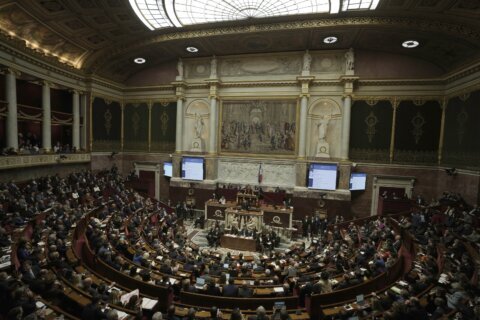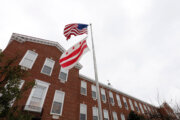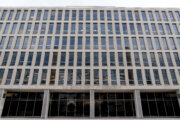The Dow Jones Industrial Average climbed to an all-time high, even as big tech companies weighed on the broader market, leading U.S. stock indexes to a mixed finish on Wall Street.
The S&P 500 fell 0.3% Monday, remaining within 0.9% of its record set in July. The Nasdaq composite fell 0.9%, pulled down by several technology companies that tend to tip the market because of their big values. Nvidia lost 2.2%, Microsoft fell 0.8%, Amazon dropped 0.9%, Meta Platforms slid 1.3% and Tesla lost 3.2%.
The Dow rose 0.2%, to 41,240, eclipsing its previous high set in mid-July. The average is less influenced by big tech, with only Apple and Microsoft among the most valuable “Magnificent Seven” stocks in the index. That helped limit the impact of the big tech decliners.
The price of U.S. crude oil jumped 3.5% after Israel and the Lebanese militant group Hezbollah traded heavy fire on Sunday, triggering potential supply worries.
Bond yields held relatively steady. The yield on the 10-year Treasury rose to 3.82% from 3.80% late Friday.
The stock market is coming off a two-week winning streak that’s helped keep the S&P 500 and Dow within striking distance of notching new highs. Monday’s mixed market finish came at the start of a week featuring another full slate of corporate earnings and the government’s latest inflation reading.
Monday started off with a surprisingly good report showing that orders for long-lasting goods from U.S. factories, including cars, jumped 9.9% in July. An update on consumer confidence is on tap for Tuesday and the U.S. will provide a revised estimate on Thursday of economic growth during the second quarter.
Semiconductor company Nvidia reports its latest financial results on Wednesday. It has been a big beneficiary of Wall Street’s mania around artificial intelligence, becoming one of the stock market’s most massive companies, with a total value topping $3 trillion. The stock is up more than 155% for the year.
Shares in other chipmakers also fell. Broadcom lost 4.1%, Advanced Micro Devices dropped 3.2% and Lam Research slid 3.4%.
All told, the S&P 500 fell 17.77 points to 5,616.84. The Dow rose 65.44 points to 41,240.52, and the Nasdaq dropped 152.03 points to close at 17,725.76.
Others companies reporting quarterly results this week include Kohl’s, Chewy, Salesforce and Dollar General.
The key report for investors this week will come on Friday, when the the government serves up its latest data on inflation with the PCE, or personal consumption and expenditures report, for July. It is the Federal Reserve’s preferred measure of inflation.
Fed Chair Jerome Powell strongly signaled on Friday that the central bank is planning to start cutting its benchmark interest rate, which currently stands at a two-decade high. The Fed raised interest rates in order to tame inflation back to its target of 2%. The final push to the target has been elusive.
Inflation has been steadily easing and economists polled by FactSet expect the latest PCE data to show a 2.6% inflation reading. The PCE was as high as 7.1% in the middle of 2022.
The Fed has been trying to tame inflation by slowing economic growth, but not by so much that it causes a recession. The dynamics of its concerns have shifted.
“Recent commentary coming out of conversations with Fed officials shows they care more about the risk of the economy slowing,” said Nathan Thooft, chief investment officer and senior portfolio manager at Manulife Investment Management.
Traders are forecasting a rate cut to come at the Fed’s meeting in September. They expect the central bank to trim its main interest rate by at least 1 percentage point by the end of the year, according to data from CME Group.
Copyright © 2025 The Associated Press. All rights reserved. This material may not be published, broadcast, written or redistributed.





